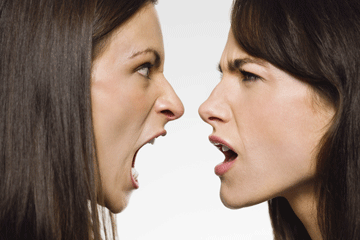
If you've ever had the distinct pleasure of sourcing stock photos for any reason, you've likely come across a whole lot of laughing women eating salads alone. But you've also probably stumbled upon a truckload of people scratching their heads to symbolize confusion, deep thought and/or perhaps a bad case of seborrheic dermatitis — dandruff. Scalp dryness aside, how exactly did the head scratch come to symbolize intellectual processes?
Some people believe that certain automatic gestures are simply natural, expressive motions our caveman predecessors passed down to us. "One popular explanation for any hand-to-head movements is that they're frustrated aggression — a reversion to the natural movements of our rock-throwing ancestors," wrote San Diego Reader columnist Matthew Alice. "If you watch a small child strike at something, he'll raise an arm over his head and bring it forward in an arc. It's a natural, unstudied movement. Not much finesse, but for a caveman it got the job done."
Advertisement
Alice also pointed to a possible anthropological explanation for head scratching: "When we're wrestling with some knotty problem, we experience feelings of frustration, perhaps some anger, and before we know it, our hand flies up in the air. But hold it. In these modern times, it's not polite to bash the guy who asked the question. So instead we deflect attention from the movement and scratch or rub our head or chin or neck." Interesting ... and kind of a dark interpretation of human behavior.
In a 2009 article for Psychology Today, author and former FBI Counterintelligence Agent Joe Navarro wrote, "When we are under stress, our brain requires a certain amount of hand to body touching (hand wringing, forehead rubbing, temple massaging, lip touching, etc.). These pacifiers serve to soothe the individual when there is negative limbic arousal [fear, stress, etc]."
More recent research seems to back up this stress theory and add another unexpected layer to the story. In a 2017 study, which was published in the journal Scientific Reports, scientists who observed 45 rhesus macaques found that scratching was more likely to occur in times of heightened stress (like standing in the presence of high-ranking or unfamiliar monkeys). It turns out monkeys who scratched were significantly less likely to be attacked by those threatening strangers.
"As scratching can be a sign of social stress, potential attackers might be avoiding attacking obviously stressed individuals because such individuals could behave unpredictably or be weakened by their stress, meaning an attack could be either risky or unnecessary," lead author Jamie Whitehouse said in the study.
So while there's no single explanation for this head scratcher (ugh, you knew that was coming — sorry), it appears acting out your anxiousness with this stereotypical tic could keep you in the good graces of others.
Advertisement

